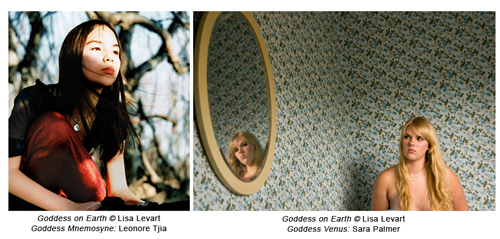Why do so many young women and girls in today's society feel disempowered? "You can't be what you can't see," Jennifer Siebel tells us in her new documentary "Miss Representation," which explores how mainstream media portrays women in limited ways. Namely, that womanhood means being young, beautiful and thin. Without realistic role models, is it really surprising that so many young women are confused, isolated and deeply depressed?
In the course of working on my book "Goddess on Earth: Portraits of the Divine Feminine," I encountered women from a diverse range of backgrounds and vocations with a variety of appearances and life paths. They did, however, all have one thing in common: they cultivated their own empowerment by identifying with a goddess and invoking her symbolic qualities.
I don't mean to say that believing in or identifying with the Goddess makes young girls immune to societal pressures of beauty, attractiveness or self-worth. But I do think that the world of goddess spirituality offers an alternative to our cultural climate, which is so focused on women's limitations -- how they look versus how they should look, how they act versus how they should act, and so forth. 
Venus, for example, is the Roman deity of beauty and love. In "Goddess on Earth," Venus is embodied by Sara Palmer, a beautiful, college-aged woman whom I have known since she was a little girl. Sara identified with Venus's preoccupation with outward perfection. She wrote that throughout her adolescence, her "insecurities have fostered an attraction to makeup, mirrors, and a compulsion to perfect [herself] before leaving the house." Her portrait is juxtaposed against an ancient sculpture of Venus, and both faces display a beautiful, somewhat inscrutable mixture of composure and vulnerability. I was impressed with Sara's honesty, and her ability to express a personal insecurity as something with deeper symbolic resonance.
Another image features Leonore Tjia, who was fourteen when I photographed her as Mnemosyne, the Grecian Goddess of memory. Now in her twenties, Leonore recently spoke with me about the intense loneliness and self-consciousness she felt as a young girl. She said reading ancient tales of the Goddess gave her access to a rich inner world filled with inspiration otherwise absent from her life. Her portrait shows her as an archetypal figure, deeply rooted in the ancient myths whose memory she keeps alive.
Towards the end of "Miss Representation," a phenomenon called "symbolic annihilation" is exposed: the lack of realistic, whole portrayals of women in the media leaves young girls disheartened and uninspired. The experience of making "Goddess on Earth" has shown me a meaningful alternative. The women and girls I photographed called on ancient archetypes of the Divine Feminine and, in doing so, revealed themselves as powerful and whole. "You can't be what you can't see," I say: explore deep and unchanging archetypes, and what you see there you can also recognize in yourself.
"Goddess on Earth" is available at: www.goddessonearth.com or join the Goddess on Earth community on Facebook.
